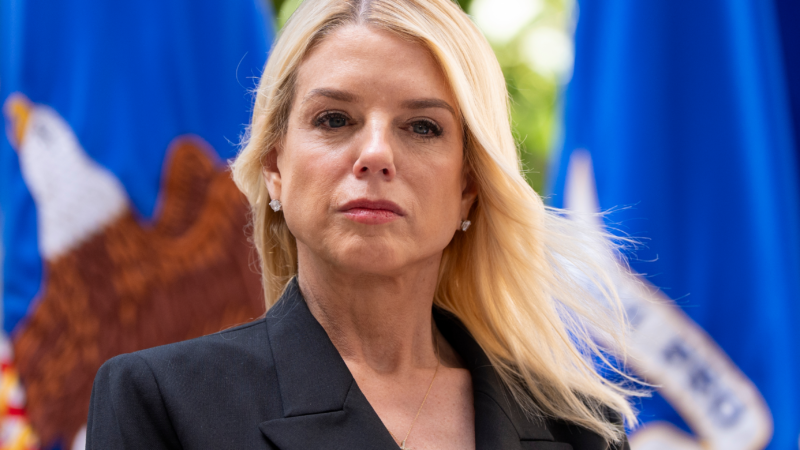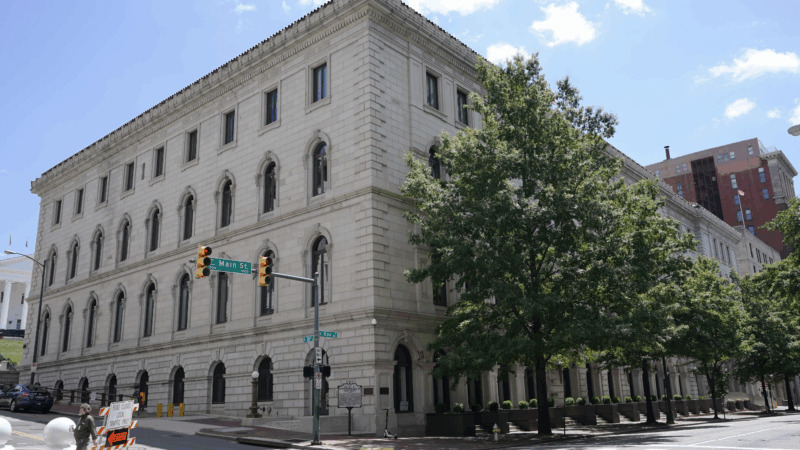Justice Department cuts to public safety grants leave police and nonprofits scrambling
The Justice Department has drastically scaled back its support for anti-crime initiatives across the country, leaving law enforcement agencies and private groups scrambling to try to replace the money. The cuts were announced in late April, and the Council on Criminal Justice estimates 373 grants were terminated, totaling about $500 million.
The sweeping nature of the cuts took many public safety groups by surprise.
“We knew that there were federal cuts coming,” says Kelsie McDaniel, the district attorney in Union County, Oregon. “But we didn’t think that it would include things that were within the program goals and agency priorities that the DOJ had previously talked about.”
Her office used a federal grant to pay for an investigator to do more in-depth crime investigations, such as building a case against fentanyl dealers whose product had led to fatal overdoses.
“We wouldn’t be able to do that without him,” McDaniel says. “We thought, well, where other programs might be getting cut, we thought we might actually see an increase in funding.”
Instead, that grant was one of the ones cancelled. Most of the money had already been spent, but she worries that the cancellation means Union County won’t be able to get this kind of federal funding again in the future.
“Federal grants allow agencies to really do things that they wouldn’t ordinarily otherwise be able to do,” says Jim Burch, president of the National Policing Institute, which helped distribute many of the grants to rural law enforcement. He says the sudden cuts, many of them mid-stream, “could result in layoffs of things like crime analysts and IT professionals. And it could mean that the agency has fewer staff for patrol services.”
Many grant recipients suspect there wasn’t much research behind the cuts.
“They don’t know what they’re doing. They’re just pulling things apart,” says Aqeela Sherrills, co-founder and executive director of the Community Based Public Safety Collective, which provides training and assistance to community violence intervention groups — the “violence interrupter” model that started in the 1990s.
“Many of these organizations are mostly volunteer, like, kind of small mom and pop agencies,” Sherrills says. “But the Biden administration turbocharged community violence intervention as a strategy,” with the 2022 passage of the Bipartisan Safer Communities Act, which dedicated $250 million over five years to this approach. Now the Trump administration is turning off that tap.
“We received a letter on April 22nd basically saying, ‘Stop all services,’ and ‘We are terminating your contract effective immediately,'” Sherrills says. He says the letter said his organization’s grant did not “align” with the administration’s priorities — the same explanation in other termination letters.
He says his organization is able to keep functioning for now, and its pivoted to showing local community violence intervention groups how to appeal the loss of their grants.
“We’re not taking the decision from the Trump administration laying down,” he says.
In response to NPR’s request for comment, the Justice Department sent a written statement:
“This Department of Justice is focused on prosecuting criminals, getting illegal drugs off the streets, and protecting all Americans from violent crime. Discretionary funds that are not aligned with the administration’s priorities are subject to review and reallocation.”
The statement added that the Department was committed to “working with” organizations and to hear appeals to restore funding, “as appropriate.”
In some cities, self-appointed fiscal watchdogs have complained about a lack of accountability in the way federal grants are spent. In Minneapolis, for instance, attorney Dean Thomson sued the city a couple of years ago to force local violence intervention groups to be more transparent.
“Taxpayers don’t know how their funds are being spent because the city didn’t know how their funds were being spent,” Thomson says. “And who knows whether the funds actually went to violence interruption or not?”
Thomson says the city settled with him, promising to require better bookkeeping by violence intervention groups that receive the grants.
He says his concern about accountability does not mean he endorses the Trump administration’s sweeping cuts.
“I think drastically cutting any program without investigating whether or not it’s working is the wrong approach,” Thomson says.
As it happens, that kind of information is increasingly available, according to Thomas Abt, founding director of the Violence Reduction Center, at the University of Maryland, which studies strategies for reducing violent crime. It’s preparing to release a major study of the track records of different kinds of programs.
“To do that work, we rely on a vast body of research — much of which has been funded by the federal government,” Abt says.
It’s the kind of information that could have informed decisions about which grants to keep and which to pull, but Abt says he’s seen no sign that the administration sought out that information.
“You would think that making a policy change this dramatic and this abruptly, that there would be some consultation before doing so. But in fact, there wasn’t,” he says.
Annual governors’ gathering with White House unraveling after Trump excludes Democrats
An annual meeting of the nation's governors that has long served as a rare bipartisan gathering is unraveling after President Donald Trump excluded Democratic governors from White House events.
Federal judge acknowledges ‘abusive workplace’ in court order
The order did not identify the judge in question but two sources familiar with the process told NPR it is U.S. District Judge Lydia Kay Griggsby, a Biden appointee.
Top 5 takeaways from the House immigration oversight hearing
The hearing underscored how deeply divided Republicans and Democrats remain on top-level changes to immigration enforcement in the wake of the shootings of two U.S. citizens.
Snowboarder Chloe Kim is chasing an Olympic gold three-peat with a torn labrum
At 25, Chloe Kim could become the first halfpipe snowboarder to win three consecutive Olympic golds.
Pakistan-Afghanistan border closures paralyze trade along a key route
Trucks have been stuck at the closed border since October. Both countries are facing economic losses with no end in sight. The Taliban also banned all Pakistani pharmaceutical imports to Afghanistan.
Malinowski concedes to Mejia in Democratic House special primary in New Jersey
With the race still too close to call, former congressman Tom Malinowski conceded to challenger Analilia Mejia in a Democratic primary to replace the seat vacated by New Jersey Gov. Mikie Sherrill.





